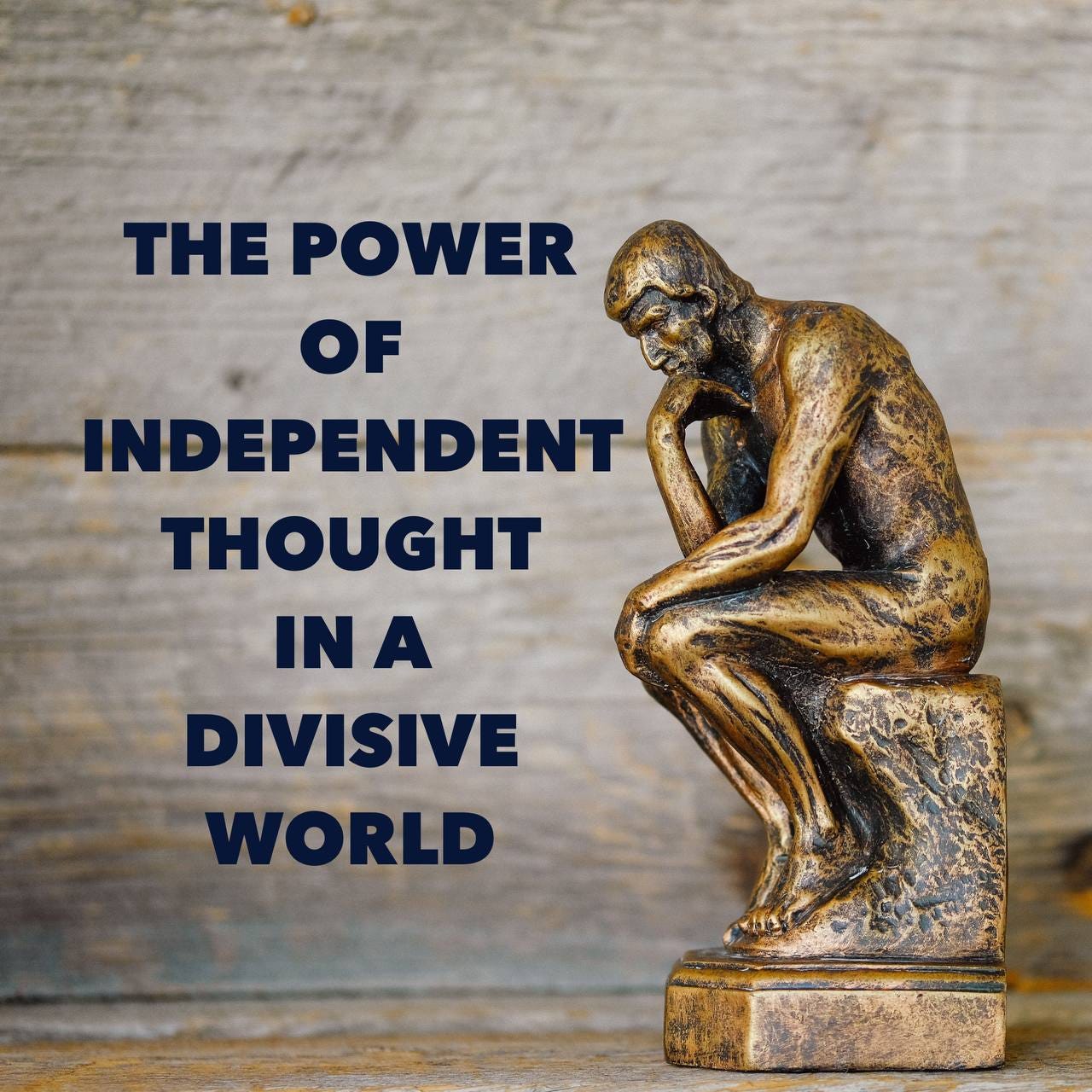The Power of Independent Thought In A Divisive World
The act of thinking for oneself is a profoundly powerful yet underutilized faculty of the human mind
The Starfire Codes produces an audience-supported publication with a stellar podcast, consciousness-expanding daily spiritual content, and well-researched articles on forbidden but crucial topics.
If you love our work, please join our constellation of curious minds and venture into forbidden realms of knowledge.
Hit that like button!
Share with fellow seekers!
If you haven’t yet, please become a Paid Subscriber to support the cosmic quest for truth!
This is what we do full time. Thank you for all of the ways you support The Starfire Codes! It means the universe to us. 🌟
In a world increasingly shaped by divisive rhetoric and limiting narratives, the ability to cut through the noise and connect to one's inner wisdom is an invaluable skill. Yet all too often, external voices seek to dictate not just what we should think, but how we should think. The resulting suppression of independent thought threatens to cramp our collective potential. However, there are those among us who dare to think differently - minds determined to write their own stories. And in their defiance of conformity lies the seed for changing paradigms.
The Questioners, the Seekers, the Creators - these are the warriors on the frontlines of consciousness. Armed with curiosity, they venture into unexplored terrain seeking hidden truths. They ask the messy questions. They challenge assumptions and reject tired dogmas. Operating outside prescribed boxes, they reveal novel possibilities and inspire new visions. For them, the act of thinking feels akin to breathing - a life force flowing through them unhindered. They do not accept implanted notions at face value but turn ideas over, examining their integrity. Minds open, not closed, they inhabit the liminal spaces between established perspectives where insight is born.
Yet expansive thinkers can find themselves pressured to shrink the scope of their awareness in a culture steeped in fear of the unfamiliar. When bold ideas disturb entrenched cognitive patterns, some react by trying to stuff such paradigmatic wanderers back into neat and tidy boxes. "Stay in your lane," they lecture. "That's not your place," they warn. Powerful entities invested in preserving existing arrangements aim to herd nonconformists back into authorized enclosures of thought through shame or brute domination. For them, independent thinking signals a loss of control over sanctioned narratives. But attempts to corral unbridled intellects often backfire, instead fortifying their sense of purpose.
Because efforts to suppress deep questioning and liberated thought tend to catalyze the very outcomes they sought to avoid. Each attempt to quell a thinker crafting their own meaning only increases the thinker's resolve to think for themselves. With each attack on those rewiring their inner paradigms comes a surge of motivation to spread such liberating rewiring even further. Ultimately, the force of controlling narratives depends on the willingness of individuals to blindly accept implanted notions. Independent thinkers short-circuit this compliance by daring to interrogate assumptions and redraw the boundaries of thought. Once they awaken to their own autonomous mental authority, external voices lose sway.
Of course, wiring one's brain for independent thought poses risks. Beyond potential persecution, it requires grappling with uncertainty, sitting alone inside questions without easy answers. Forging new cognitive trails means traversing unfamiliar terrain with no map to follow. It demands rigorous self-confrontation, stripping away layers of inherited biases and assumptions until one connects to inner wisdom. Such shadow work disturbs the ego and removes the comfort of fitting neatly into groupthink. But a commitment to tracing one's own mental topography offers rich rewards. It allows us to develop more coherent inner worlds, integrating disconnected aspects of ourselves. And it enables us to then construct more enlightened shared realities.
The thinker who learns to navigate their inner landscape with curiosity and compassion develops an inner security not easily shaken. Their sense of authority comes from connection to their sovereign mind. And from this centered place, they are able to discern external voices clearly. Agency rises within. Input from without is evaluated on its merits, not on the established pedigree of its source. In this way, independent thinkers are able to absorb constructive insight wherever it manifests while releasing ideas misaligned with their honed values. The boundaries between inner and outer dissolve. There is just the wisdom, and they attune to it directly.
Click here to book a personal reading….
Equipped with this inner compass, independent thinkers are less vulnerable to the manipulations of those trying to control narratives for their own gain. Their minds remain permeable to new data but impervious to disempowering agendas. They choose which voices to tune into, instructing their attention to amplify the insightful while tuning out the deceptive. From this intentional space, they distill signal from noise. While powerful entities expend enormous resources trying to manipulate how people think, the autonomous thinker sees through these efforts. Their connection to source provides a clear window into reality.
Of course, critical and independent thinking does not necessitate rejecting all external input outright. Even the most self-directed thinkers understand the value of absorbing constructive insight from sources outside of themselves. They appreciate that open and curious engagement with diverse perspectives offers opportunities for growth. There is wisdom in entertaining worldviews which diverge from our preconceptions. For it is by testing our beliefs against contradictory evidence that we are challenged to develop more nuanced positions. The path of the independent thinker involves not blanket rejection but selective integration of external input. With minds wide open, we take in ideas from without, then turn inward to examine them against the compass of our evolving values. We meet perspectives not with attack but calm self-possession, allowing whatever truth they might hold to percolate through us. That which is not aligned with truth cannot sustain itself indefinitely. And so we can release the rest, confident that any misaligned aspects will over time fade away.



